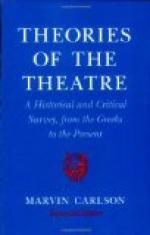When a play is really about something, it is always possible for the critic to state the theme of it in a single sentence. Thus, the theme of The Witching Hour is that every thought is in itself an act, and that therefore thinking has the virtue, and to some extent the power, of action. Every character in the piece was invented to embody some phase of this central proposition, and every incident was devised to represent this abstract truth concretely. Similarly, it would be easy to state in a single sentence the theme of Le Tartufe, or of Othello, or of Ghosts. But who, after seeing four out of five of the American plays that are produced upon Broadway, could possibly tell in a single sentence what they were about? What, for instance—to mention only plays which did not fail—was Via Wireless about, or The Fighting Hope, or even The Man from Home? Each of these was in some ways an interesting entertainment; but each was valueless as drama, because none of them conveyed to its auditors a theme which they might remember and weave into the texture of their lives.
For the only sort of play that permits itself to be remembered is a play that presents a distinct theme to the mind of the observer. It is ten years since I have seen Le Tartufe and six years since last I read it; and yet, since the theme is unforgetable, I could at any moment easily reconstruct the piece by retrospective imagination and summarise the action clearly in a paragraph. But on the other hand, I should at any time find it impossible to recall with sufficient clearness to summarise them, any of a dozen American plays of the usual type which I had seen within the preceding six months. Details of incident or of character or of dialogue slip the mind and melt away like smoke into the air. To have seen a play without a theme is the same, a month or two later, as not to have seen a play at all. But a piece like The Second Mrs. Tanqueray, once seen, can never be forgotten; because the mind clings to the central proposition which the play was built in order to reveal, and from this ineradicable recollection may at any moment proceed by psychologic association to recall the salient concrete features of the action. To develop a play from a central theme is therefore the sole means by which a dramatist may insure his work against the iniquity of oblivion. In order that people may afterward remember what he has said, it is necessary for him to show them clearly and emphatically at the outset why he has undertaken to talk and precisely what he means to talk about.




